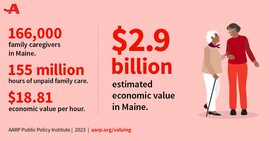
Caregiver-friendly businesses enhance today’s marketplace
Caregiving for a loved one may be one of the most important roles any of us will ever assume in our lives. Anyone who has been a caregiver understands that this role, while rewarding and deeply meaningful, can also be complex and time-consuming. For caregivers who also work part-time or full-time, it can be extremely difficult to manage the demands of one’s job and the needs at home. It is not surprising that many caregivers report feeling overwhelmed in their struggle to find a balance between these two worlds.

Employees who are caregivers may not always see themselves as caregivers. Rather, many think of themselves as simply performing a labor of love to assist a family member, a friend or a neighbor. However, according to the US Department of Labor Statistics, “nearly 75% of employees have caregiving responsibilities outside of work,” and this number is only expected to grow.
Taking stock of the makeup of one’s workforce signals an opportunity for businesses large and small to refresh their office culture, build trust and successfully bolster job attendance and overall job satisfaction. Many caregivers may not feel comfortable openly discussing caregiving at work – even with co-workers – because they worry that it might affect the perception of their work performance. This highlights an important part of the process for employers in addressing the needs of employee caregivers: implementing workplace policies that open communication lines to better navigate daily challenges while still ensuring that business and job metrics are met.
By working together, businesses and employees of all ages can more effectively create a caregiver-friendly environment. Certain business policies that can make a significant difference could be easy to implement. For example, certain employers offer flexible work hours on days when a caregiver needs to take a loved one to a medical appointment. Some employers support a telework schedule, which can be especially helpful if a caregiver, a valued employee, must pay for outside help to care for their loved one. Others schedule office get-togethers within the framework of the workday rather than after-hours when a caregiver may be unavailable. Today, some companies even allow paid leave, particularly for those employees caring for loved ones with high care needs due to dementia or serious illness. AARP offers a myriad of helpful guides, tools and other resources designed especially for employers at www.aarp.org/work/caregiving-resources.
A helpful local resource for Maine caregivers is the AARP Family Caregiver Resource Guide. Chock full of contact information for state-specific resources, this guide can help Maine caregivers get the type of assistance they need in their own community. The guide can also serve as an opportunity for employers to learn more about available programs that could benefit their employees. Send an email to me@aarp.org for a free copy of this guide, available in hard copy or PDF format.
With 166,000 family caregivers in Maine alone, we know that by sharing resources in our own communities, and enhancing workplace flexibility, we can make a difference for Maine business leaders and for family caregivers across the state. As you prepare for your own journey as a caregiver or as an employer, we hope you will reach out to us at AARP Maine if you have any questions about the resources we have for you.












0 Comments